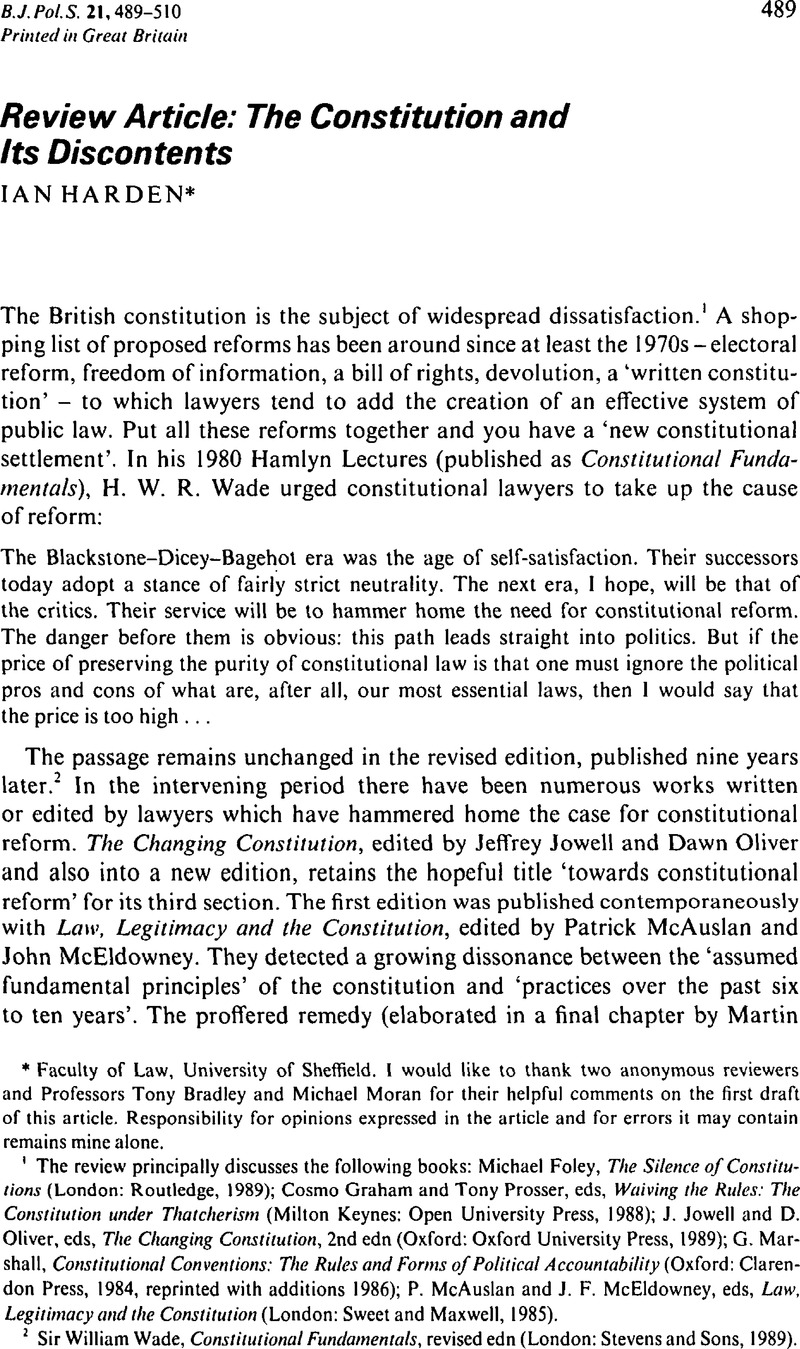Article contents
The Constitution and Its Discontents
Published online by Cambridge University Press: 27 January 2009
Abstract

- Type
- Review Article
- Information
- Copyright
- Copyright © Cambridge University Press 1991
References
1 The review principally discusses the following books: Foley, Michael, The Silence of Constitutions (London: Routledge, 1989)Google Scholar; Graham, Cosmo and Prosser, Tony, eds, Waiving the Rules: The Constitution under Thatcherism (Milton Keynes: Open University Press, 1988)Google Scholar; Jowell, J. and Oliver, D., eds, The Changing Constitution, 2nd edn (Oxford: Oxford University Press, 1989)Google Scholar; Marshall, G., Constitutional Conventions: The Rules and Forms of Political Accountability (Oxford: Clarendon Press, 1984, reprinted with additions 1986)Google Scholar; McAuslan, P. and McEldowney, J. F., eds, Law, Legitimacy and the Constitution (London: Sweet and Maxwell, 1985).Google Scholar
2 SirWade, William, Constitutional Fundamentals, revised edn (London: Stevens and Sons, 1989).Google Scholar
3 Gamble, Andrew, ‘Theories of British Politics’, Political Studies, 38 (1990), 404–20.CrossRefGoogle Scholar
4 Dearlove, J., ‘Bringing the Constitution Back In: Political Science and the State’, Political Studies, 37 (1989), 521–39.CrossRefGoogle Scholar
5 Hall, Peter A., Governing the Economy: The Politics of State Intervention in Britain and France (Oxford: Polity Press, 1986), p. 19Google Scholar; Grant, Wyn, The Political Economy of Corporatism (London: Macmillan, 1985)CrossRefGoogle Scholar; Crouch, C. and Dore, R., eds, Corporatism and Accountability: Organized Interests in British Public Life (Oxford: Oxford University Press, 1990).Google Scholar
6 Gamble, , ‘Theories of British Politics’, pp. 409–10.Google Scholar
7 Dearlove, , ‘Bringing the Constitution Back In’, p. 534Google Scholar; Dearlove qualifies ‘outside politics’ with the word ‘almost’.
8 Dicey, A. V., Introduction to the Study of the Law of the Constitution, 10th edn by Wade, E. C. S. (London: Macmillan, 1959), pp. 40, 422.Google Scholar
9 See, in particular, Dworkin, Ronald, Law's Empire (London: Fontana, 1986).Google Scholar
10 For the contrary view, see Ridley, F. F., ‘There Is No British Constitution: A Dangerous Case of the Emperor's Clothes’, Parliamentary Affairs, 41 (1988), 340–61.Google Scholar
11 Ridley, , ‘There Is No British Constitution’, pp. 343, 347.Google Scholar
12 Dworkin, , Law's Empire, p. 364.Google Scholar On the same point see also Ackerman, Bruce, ‘Constitutional Politics/Constitutional Law’, Yale Law Journal, 99 (1989), 453–547, at p. 456.CrossRefGoogle Scholar
13 Ackerman, , ‘Constitutional Politics/Constitutional Law’, p. 454.Google Scholar
14 Dworkin, , Law's Empire, p. 52.Google Scholar The method which Norman Lewis and I used in The Noble Lie: The British Constitution and the Rule of Law (London: Century Hutchinson, 1986)Google Scholar is also a variety of ‘constructive interpretation’. We labelled it ‘immanent critique’, thereby causing some confusion (see Loughlin, M., ‘Tinkering with the Constitution’, Modern Law Review, 51 (1988), 531–48, and our reply at pp. 812–16).CrossRefGoogle Scholar
15 I have drawn here on Dworkin's criticism of what he calls ‘global internal scepticism’. See Law's Empire, pp. 79, 266–75.Google Scholar
16 See, for example, McAuslan, and McEldowney, , Law, Legitimacy and the Constitution, pp. 10, 105Google Scholar and Loughlin, , ‘Tinkering with the Constitution’.Google Scholar
17 Dicey, , The Law of the Constitution, pp. 39–40.Google Scholar
18 Jowell, and Oliver, , The Changing Constitution, pp. 30–1.Google Scholar But see also fn. 27.
19 Dicey, , The Law of the Constitution, pp. 41–50.Google Scholar
20 SirJennings, Ivor, The Law and the Constitution, 5th edn (London: London University Press, 1959), p. 109.Google Scholar Jennings's conclusion that parliament could legislate to alter the rule was persuasively rejected by Wade, H. W. R. in ‘The Legal Basis of Sovereignty’, Cambridge Law Journal (1955), 172–97.Google Scholar
21 Jennings himself makes this point in The Law and the Constitution, pp. 144–5.Google Scholar However, his subsequent discussion of ‘sovereignty’ focuses on law and the courts, not the constitution. This is also the case with Wade's article cited in the previous footnote.
22 Pickin v British Railways Board [1974] AC 765, at 789.Google Scholar
23 6 George 3 c. XII. For discussion of the context of the Act see Amar, Akhil Reed, ‘Of Sovereignty and Federalism’, Yale Law Journal, 96 (1987), 1425–1520.CrossRefGoogle Scholar For the contemporary relevance of the denial of federalist claims, see Crick, Bernard, ‘The Sovereignty of Parliament and the Scottish Question’, in Lewis, N., ed, Happy and Glorious: The Constitution in Transition (Milton Keynes: Open University Press, 1990).Google Scholar
24 See Emden, Cecil S., The People and the Constitution, 2nd edn (Oxford: Oxford University Press, 1956).Google Scholar
25 Harden, and Lewis, , The Noble Lie.Google Scholar
26 For use of the concept in this way, see Harden, Ian, ‘Sovereignty and the Euro Fed’, Political Quarterly, 61 (1990), 402–14.CrossRefGoogle Scholar
27 See Wade, E. C. S. and Bradley, A. W., Constitutional and Administrative Law, 10th edn by Bradley, A. W. (London: Longman, 1985), p. 70.Google Scholar
28 Foley, , The Silence of Constitutions, p. 96.Google Scholar The internal quotation is from Norton, Philip, The Constitution in Flux, Oxford: Martin Robertson, 1982), p. 1.Google Scholar
29 Hill, Christopher, Intellectual Origins of the English Revolution (Oxford: Clarendon, 1965), p. 65.Google Scholar
30 See Harden, and Lewis, , The Noble LieGoogle Scholar; and, for application of the principle to corporatist arrangements, Birkinshaw, P., Harden, I. J. and Lewis, N., Government by Moonlight: The Hybrid Parts of the State (London: Unwin Hyman, 1990).Google Scholar
- 3
- Cited by




